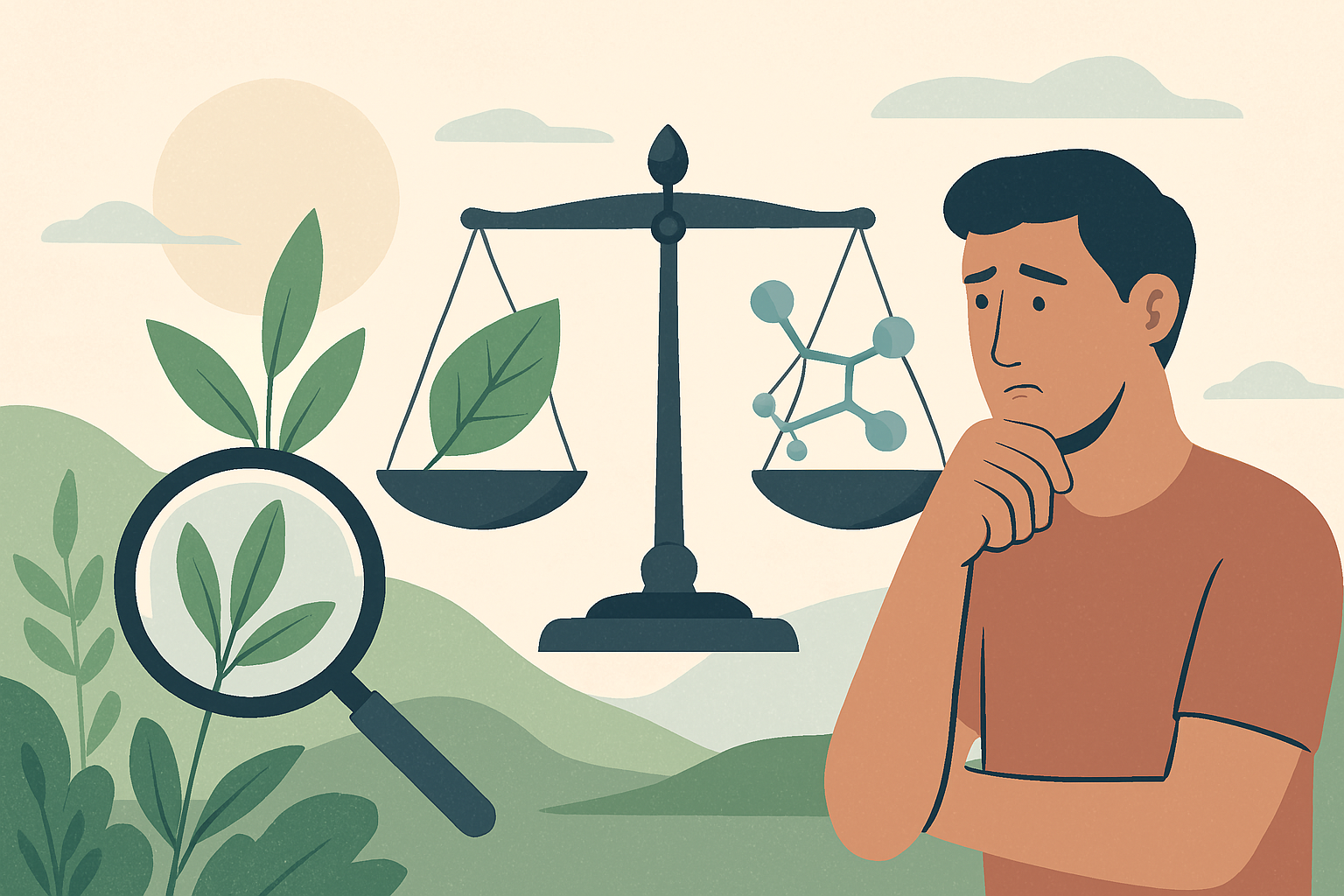The Appeal of a Natural Solution
When faced with erectile dysfunction (ED), many men look for natural remedies before turning to medication. It’s understandable — natural options often feel safer, more accessible, and less intimidating than prescription drugs. But not all natural treatments are created equal. Some have real science behind them, while others are based on myths or marketing hype. In this article, we’ll explore which natural remedies may actually help, which ones to avoid, and how to approach ED with a holistic mindset.
Why Natural Remedies?
Men often prefer natural remedies for several reasons:
- Concern about medication side effects
- Desire to treat the root cause, not just the symptoms
- Preference for lifestyle changes over pharmaceutical solutions
- Cultural or personal values that emphasize holistic health
While this approach is valid, it’s important to base your choices on evidence, not just advertising.
Natural Remedies That May Work
1. L-Arginine and L-Citrulline
These are amino acids that help the body produce nitric oxide, the molecule responsible for relaxing blood vessels and increasing blood flow to the penis. Some studies show that supplementing with L-arginine or L-citrulline can modestly improve ED, especially in men with mild symptoms. Combining them with pycnogenol (a plant extract) has shown better results.
2. Panax Ginseng
Known as “herbal Viagra,” this adaptogenic herb has been used in traditional medicine to improve stamina and sexual function. Some studies suggest it may improve erection quality and libido by boosting nitric oxide and energy levels. Choose red Korean ginseng for the most researched benefits.
3. Ashwagandha
A popular Ayurvedic herb that may reduce stress and improve testosterone levels. While more research is needed on its direct impact on ED, it can help men whose sexual performance is affected by anxiety or low energy.
4. Maca Root
This Peruvian root is believed to increase libido and improve energy. Studies show mixed results, but some men report subjective improvements in desire and sexual performance. It may be more useful for boosting libido than for treating physical ED.
5. Yohimbine
Derived from the bark of an African tree, yohimbine was once used in pharmaceutical form to treat ED. It may increase blood flow and nerve stimulation, but side effects like high blood pressure, anxiety, and heart palpitations make it risky. Use only under supervision — if at all.
6. Ginkgo Biloba
This herbal supplement may increase blood circulation and is sometimes used for memory and cognitive health. Some studies suggest it may help with ED related to antidepressant use, but evidence is limited.
Lifestyle-Based “Natural” Treatments That Work
Exercise
One of the most effective natural remedies. Regular physical activity improves blood flow, boosts testosterone, reduces stress, and enhances cardiovascular health — all critical for strong erections.
Weight Loss
Losing even 5–10% of body weight can significantly improve ED, especially in overweight or obese men. It improves insulin sensitivity, hormone balance, and vascular function.
Sleep Optimization
Getting 7–9 hours of quality sleep helps regulate testosterone, reduce cortisol, and support nervous system function — all essential for sexual performance.
Stress Reduction
Practices like meditation, deep breathing, and mindfulness reduce anxiety and improve focus during intimacy. Lower stress means better erections and more satisfying sexual experiences.
Pelvic Floor Exercises (Kegels)
Strengthening the pelvic floor muscles improves blood flow, muscle control, and erectile firmness. Kegels are especially useful for men with mild ED or urinary issues.
Natural Remedies That Don’t Live Up to the Hype
Horny Goat Weed
Popular in many male enhancement products, but evidence is limited. The active ingredient (icariin) shows potential in lab studies, but not enough human research exists to recommend it confidently.
Deer Antler Velvet
Marketed for testosterone and performance, but lacks solid scientific support and may pose hormonal risks.
Tribulus Terrestris
A common ingredient in testosterone boosters, but most research shows no significant effect on testosterone or erectile function in healthy men.
Essential Oils and Aromatherapy
While they may reduce stress or enhance mood, there’s no evidence they directly improve ED.
The Placebo Effect Is Real
In ED studies, placebo groups often report improvement. That’s because expectation, attention, and belief play a role in arousal. If you believe a remedy will help, your brain may respond positively — at least temporarily. This doesn’t mean the remedy works medically, but it shows how important the mind-body connection is in sexual health.
Safety First: What to Watch Out For
- Lack of regulation: Supplements aren’t FDA-approved, so quality varies
- Hidden ingredients: Some “natural” products contain unlisted pharmaceutical drugs
- Drug interactions: Herbal remedies can interact with medications for blood pressure, depression, or diabetes
- Overdosing: More is not always better — stick to recommended dosages
Always talk to your doctor before starting any supplement, especially if you take other medications or have health conditions.
A Smart Strategy for Natural ED Treatment
- Start with lifestyle changes — exercise, diet, sleep, stress management
- Use supplements with proven benefits (L-arginine, ginseng, etc.)
- Avoid miracle pills or extreme claims
- Track your progress and how you feel
- Consult a professional if symptoms persist beyond 3 months
Final Thoughts: Natural Doesn’t Mean Ineffective — or Risk-Free
There’s no shortage of “natural cures” for ED on the internet, but only a few have science to back them. Natural remedies can play a powerful role in ED treatment — especially when combined with healthy lifestyle habits and medical support when needed. Focus on what works, be cautious with trends, and remember: improving sexual health is about caring for your whole body, not just one part of it.
